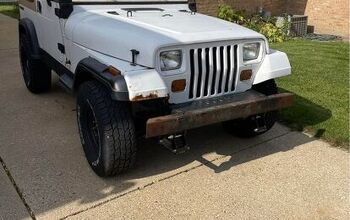Slow-Moving NAFTA Talks Could Be Further Hampered by Mexico's Next President

With NAFTA negotiations finally progressing a bit, now would be the perfect time for something to bring up another potential hurdle and ruffle everyone’s feathers. This time, the prospective cataclysm stems from Mexico, and has manifested itself as one man — presidential frontrunner Andres Manuel Lopez Obrador, known colloquially as “AMLO.”
Business interests and NAFTA advocates are fearful the leftist candidate could chuck a wrench into the trade policy by adopting a hardline stance opposing the White House’s plan to redefine the agreement to favor the United States. Lopez Obrador is a long-time proponent of social programs that help vulnerable members of society. However, many criticize him for being a populist with socialist ideals that do not serve the financial well-being of the country at large.
While this is debatable, winning Mexico’s July 1st election could see him push back hard against U.S. trade proposals, stalling progress.
Thus far, Lopez Obrador has made a few promises after accepting the nomination by the Morena party last week. These include implementing widespread austerity measures for Mexico, subsidizing its farmers, and ending gasoline and diesel imports from the United States. The hope is to make the country more self-sufficient in terms of food and energy, but critics have accused the promises of being the tip of a protectionist-shaped iceberg.
Further complicating things is a fairly consistent belief that Lopez Obrador has an anti-American bent and is strongly adverse to trade. There is certainly past evidence to support these claims, and there is also plenty that refutes it. That’s especially true of late. Since putting in his presidential bid, ALMO has said he wants to establish a harmonious relationship with the U.S.
“When we work together, everyone wins. But in confrontation, the United States and Mexico will both lose,” he explained last May. But he simultaneously accused the Trump administration of xenophobia and racism, casting some doubt over his ability to work with Washington pragmatically.
One thing is certain, however. If Lopez Obrador wins, he has said he’d like to negotiate NAFTA himself. This has North American businesses supremely concerned, as nobody knows exactly what he wants to see from it. Meanwhile, Ricardo Anaya of the National Action Party is seen as a safer bet — and far less likely to shake up trade. Currently, Anaya is polling just behind Lopez Obrado in the national election. Jose Antonio Meade, the former finance minister for the ruling Institutional Revolutionary Party, also supports free trade and plenty of foreign investment. He’s lost ground to both candidates since the start of this year.
Fortunately, Lopez Obrado seems to understand there is a lot riding on NAFTA. Placing Mexico’s automotive industry at risk doesn’t appear to be something he takes lightly. Last week, he said he wanted to meet with international business leaders to better understand how to adopt policies to help move the country forward.
“It’s becoming increasingly clear that he believes NAFTA has been positive for Mexico, or at the very least that a withdrawal from NAFTA would be incredibly harmful for him and the country,” Duncan Wood, director of the Mexico Institute at the Wilson Center in Washington, told Automotive News in an interview.
Wood also understands that Lopez Obrado is still a bit of a wild card, and that’s making plenty of people in the business community very nervous. “I think there’s an enormous amount of confusion out there about which is the real AMLO,” he said. “And I think he is being deliberately ambiguous on a lot of these issues.”
The potential threat Lopez Obrado poses to NAFTA is a long way off. Even if he does win the election, Mexico’s next president won’t be inaugurated until December. Negotiations could be done by then. Then again, the painfully slow progress of talks will certainly push things well past the initial March deadline. Experts now suggest real headway may not be made until the middle of summer at the earliest, claiming it would be absolutely feasible to see trade negotiations continuing into next year.

A staunch consumer advocate tracking industry trends and regulation. Before joining TTAC, Matt spent a decade working for marketing and research firms based in NYC. Clients included several of the world’s largest automakers, global tire brands, and aftermarket part suppliers. Dissatisfied with the corporate world and resentful of having to wear suits everyday, he pivoted to writing about cars. Since then, that man has become an ardent supporter of the right-to-repair movement, been interviewed on the auto industry by national radio broadcasts, driven more rental cars than anyone ever should, participated in amateur rallying events, and received the requisite minimum training as sanctioned by the SCCA. Handy with a wrench, Matt grew up surrounded by Detroit auto workers and managed to get a pizza delivery job before he was legally eligible. He later found himself driving box trucks through Manhattan, guaranteeing future sympathy for actual truckers. He continues to conduct research pertaining to the automotive sector as an independent contractor and has since moved back to his native Michigan, closer to where the cars are born. A contrarian, Matt claims to prefer understeer — stating that front and all-wheel drive vehicles cater best to his driving style.
More by Matt Posky
Latest Car Reviews
Read moreLatest Product Reviews
Read moreRecent Comments
- Lichtronamo Watch as the non-us based automakers shift more production to Mexico in the future.
- 28-Cars-Later " Electrek recently dug around in Tesla’s online parts catalog and found that the windshield costs a whopping $1,900 to replace.To be fair, that’s around what a Mercedes S-Class or Rivian windshield costs, but the Tesla’s glass is unique because of its shape. It’s also worth noting that most insurance plans have glass replacement options that can make the repair a low- or zero-cost issue. "Now I understand why my insurance is so high despite no claims for years and about 7,500 annual miles between three cars.
- AMcA My theory is that that when the Big 3 gave away the store to the UAW in the last contract, there was a side deal in which the UAW promised to go after the non-organized transplant plants. Even the UAW understands that if the wage differential gets too high it's gonna kill the golden goose.
- MKizzy Why else does range matter? Because in the EV advocate's dream scenario of a post-ICE future, the average multi-car household will find itself with more EVs in their garages and driveways than places to plug them in or the capacity to charge then all at once without significant electrical upgrades. Unless each vehicle has enough range to allow for multiple days without plugging in, fighting over charging access in multi-EV households will be right up there with finances for causes of domestic strife.
- 28-Cars-Later WSJ blurb in Think or Swim:Workers at Volkswagen's Tennessee factory voted to join the United Auto Workers, marking a historic win for the 89- year-old union that is seeking to expand where it has struggled before, with foreign-owned factories in the South.The vote is a breakthrough for the UAW, whose membership has shrunk by about three-quarters since the 1970s, to less than 400,000 workers last year.UAW leaders have hitched their growth ambitions to organizing nonunion auto factories, many of which are in southern states where the Detroit-based labor group has failed several times and antiunion sentiment abounds."People are ready for change," said Kelcey Smith, 48, who has worked in the VW plant's paint shop for about a year, after leaving his job at an Amazon.com warehouse in town. "We look forward to making history and bringing change throughout the entire South." ...Start the clock on a Chattanooga shutdown.


































Comments
Join the conversation
There's a good chance that Obrador's election would work fine for Trump: https://www.politico.com/magazine/story/2018/02/26/donald-trump-nafta-negotiations-217085 TL;DR - Trump is slow rolling the negotiations because uncertainty about the future of NAFTA helps him politically. However, sooner or later he has to either kill NAFTA or produce a new deal that he'll have to sell, and neither option will be smooth sailing for him.
Wait! was there something abut cars in there?